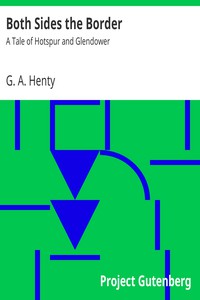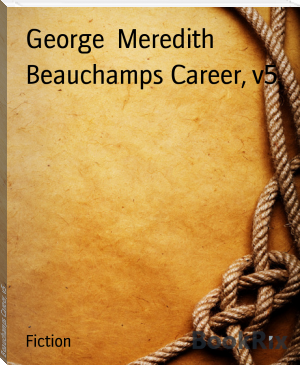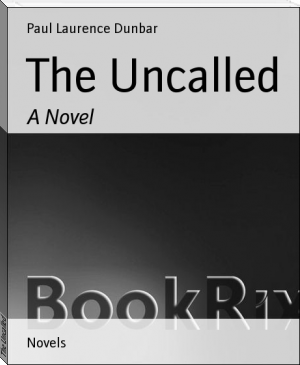Both Sides the Border: A Tale of Hotspur and Glendower by G. A. Henty (literature books to read .txt) 📗

- Author: G. A. Henty
Book online «Both Sides the Border: A Tale of Hotspur and Glendower by G. A. Henty (literature books to read .txt) 📗». Author G. A. Henty
The latter had now taken the offensive, and advanced towards Hereford, and carried fire and sword through Mortimer's lands. Sir Edmund gathered his own and his nephew's tenants and retainers, from Herefordshire and Radnorshire, and advanced against Glendower. The armies met on the 22nd of June, 1402, at a short distance from Knighton. The battle was obstinately fought, but was decided by the desertion of the Welsh tenants, and by the Welsh bowmen in Mortimer's service turning their bows against his men-at-arms; and, finally, the English were defeated, with the loss of eleven hundred men, Sir Edmund himself being made a prisoner.
After the battle the Welsh behaved with the greatest savagery; killing all the wounded, stripping the fallen, and horribly mutilating their bodies. The news created great excitement at Alnwick and, had not the situation in the north been critical, Percy would have gathered his forces and marched, with all speed, to avenge the defeat and capture of his brother-in-law.
The Earl of Dunbar, with many of the tenants of his former estates, and numbers of the English borderers, had entered Scotland and carried out considerable raids. In revenge for this, Douglas despatched Thomas Halliburton and Patrick Hepburn, each with a considerable force, to invade Northumberland. Halliburton ravaged the country as far as Bamborough, collected great spoils, and returned with them. Hepburn, who had a still larger force, penetrated farther into England, carried his ravages to within a few miles of Alnwick; and then retired north, with an enormous amount of booty.
When, however, he had crossed the border into the country known as the Merse, north of Berwick, the Earl of Dunbar fell upon him at West Nesbit, and completely defeated him. Hepburn himself, with a large number of his men, fell in the battle; and many important prisoners were captured. This battle was fought on the same day that Glendower defeated Mortimer.
The victory caused great exultation on the border; but Alwyn said to his nephew:
"Although this is good, as far as it goes, Oswald, you may be sure that Douglas will not brook this disaster with patience, but will gather the Scottish forces; and we may expect him, ere long, at the head of twenty thousand men, and we shall have a fight as stiff as that of Otterburn. We shall have Northumberland ablaze, and you will see that the earl and Hotspur will soon be preparing to meet the storm.
"These last forays took them by surprise; and, as lords of the marches, they have suffered serious humiliation, for this victory was not theirs, but the work of Dunbar; and had he not intercepted the Scots, on their own side of the border, they would have returned, scatheless, with the spoils of our northern districts. This disgrace will spur them on to make great efforts, and these will be needed, or we shall see Northumberland, Cumberland, and Durham in flames."
Alwyn was not mistaken. Messengers were sent off to all those holding knights' feus, throughout the county, bidding them to prepare to answer to the Percy's call; and to hold themselves, and their tenants, in readiness to march to any point fixed upon for a general rendezvous. They were to warn all the countryside that, directly news arrived that the Scots were in motion, they were to drive their cattle and horses to the nearest fortified town, or to take them to hiding places among the hills. Everything of value was to be taken away, or hidden, so that the enemy should find but empty houses.
Oswald rode to Yardhope, with the message to his father.
"I know, Father," he said, "that it needed not to warn you; but as it was but a short distance out of my way to come round here, I thought that I would pay you a day's visit."
"No, lad; directly I heard of the victory of Dunbar, I said to myself, this will bring the Scots upon us in force. Douglas will never put up with the defeat, and will make every effort to turn the tables. I shall send all there is worth taking away, to a shepherd's hut among the fells; and shall, as soon as I hear that Douglas's preparations are well-nigh complete, journey with your mother to Alnwick, and leave her there. I shall return, and with my men will drive the cattle and horses to places where there is little chance of the Scots finding them; and will then, after leaving three or four men to look after them, come back to Alnwick.
"What do you propose to do?"
"I shall do much the same, Father. Stoubes is strong enough to hold out against any ordinary raid, but not against an army led by Douglas. I shall remove the furnishing and tapestry, and shall send the most valuable into Alnwick, and have the rest of them hidden in the woods. These are the orders that have been sent, all along the border. Any whose places are so strong that they may well defend themselves, for some time, are to gather all their neighbours there. The rest are to repair to Alnwick, to join Percy's force.
"You see, there is no knowing where the storm may break. The Scots may cross the Cheviots anywhere between Berwick and Carlisle; and, until their movements are known, the earl and Hotspur must keep their forces at Alnwick, in readiness to march wheresoever required.
"Hotspur has sent messengers down to the Midlands, to engage as many archers as he can get. Of course, we have many here; but the borderers are spearmen rather than archers, and it were well to strengthen our force. Still, however large a force he may raise, we cannot hope to check their first incursion. The whole country is open to them and, if they enter near Carlisle, they may be in the heart of Cumberland, or Durham, before we are fairly in motion. We may count, however, on meeting them as they retire, if not before."
Oswald then rode to his own place, bade all the tenants prepare to ride with him to Alnwick, at an hour's notice; and either to send their women and children on there, as soon as it was known that the Scotch army was gathering strongly on the border; or else to gather stores of provisions, up in the hills, and to send the women and children there, the moment word came that the Scots were on the move.
The news of Mortimer's defeat and capture had been received, by the time Oswald returned to Alnwick.
"'Tis bad news, indeed," Percy said to him, "and I know that, as you have been staying so long at Ludlow, you will be deeply grieved at the misfortune that has befallen Mortimer. However, I doubt not that he will soon be ransomed. I know that the king appointed a commission of knights, to treat at once with Glendower for Lord Grey's ransom, and has given orders for the raising of the great sum demanded. It is to be gathered from a tax on church properties, and in other ways; and doubtless he will do the same for Mortimer, whose lands have been so harried, by the Welsh, that it will be impossible to raise any large sum from the tenants."
"I fear, Sir Henry," Oswald said, "that the king will be lukewarm on the subject. During his three invasions, he has never once summoned Sir Edmund to join him; nor has he passed through Ludlow, as he might well have done, seeing that it is a central position, and the nearest way for an army marching towards Plinlimmon. I remarked, too, that when I mentioned Mortimer's name in my discourse with him, the king's brow clouded, as if ill pleased at the name."
"Then he acts wrongly," Hotspur said angrily. "Mortimer has given no cause for offence. He has never, in any way, upheld the cause of the young Earl of March; and knows, well enough, that it would be madness to set up his claim to the throne, when Henry has given no cause for complaint, and that the boy's existence seems to be well-nigh forgotten by the country.
"However, as soon as this business is over I will, myself, to London; and will beg the king to exercise the same benevolence, in the case of Mortimer, as he has shown on behalf of Lord Grey. Why, he might as well suspect us, to whom he largely owes his kingdom, as Mortimer, seeing that my wife is aunt to the young earl."
Early in August it became known that preparations were being made, upon a great scale, by Douglas for the invasion of England; and that, as Military Governor of Scotland, he had summoned all the great nobles to join, with their forces; and it was even said that numbers of French knights were, on account of the long friendship between France and Scotland, crossing the seas, to fight under Douglas against their old enemies.
"Methinks," Hotspur said to his knights, "there can be little doubt that there is an agreement between Scotland and Glendower; and this would account for the fury the Welshmen have been showing, and the manner in which they have destroyed the cathedrals, churches, and castles alike; and so forced Henry to march against them, with the forces of the greater part of England, just when Douglas is preparing to assail us here.
"The forces of Westmoreland, Cumberland, Durham, and Northumberland, if together, might hope to make a stout resistance, even against so large a force as Douglas is collecting; but we cannot so gather. The Earl of Westmoreland, who commands the forces of his own county and Cumberland, must needs hold them together; lest the Scots pour down, besiege Carlisle, and carry fire and sword through those counties.
"From here up to Berwick the country has been so plundered, and devastated, that it is almost a desert; and I can draw no strength from there. As to Durham, they urge, and with some truth that, as the Scots have, before now, laid portions of their county waste, they cannot send their forces so far north as this place; as it would leave them unprotected, should the enemy march through Tynedale into their county.
"The king has entered Wales with the fighting men of thirty-four counties, so from him no aid can be expected; and it seems to me that we shall be quite unable to make head against the invasion; though assuredly, when we have gathered our forces, and are joined by those Dunbar will bring us, we will meet them as they return, spoil laden, to the border."
Well-mounted messengers had been placed on every road by which the Scots could cross the border; and on the 18th of August, one came with the news that, twelve hours before, they had crossed into Cumberland at Kirksop Foot; that they were reported to be ten thousand strong; and that a dozen villages were already in flames. Another portion of their army had crossed near Tynehead, and were pouring into Tynedale.
John Forster and his wife had arrived, some days before. Oswald had found comfortable lodgings for his mother in the town, which was already crowded with women and children from the border. His father had left again, at once; but returned, with twenty spears, twelve hours after the messenger had brought the news.
"I had two or three of my men out," he said to Oswald, as he rode in and dismounted in the castle yard; "but as soon as I heard that the Scots had entered Tynedale, I knew that it was time to be off, for they are sure to send over strong parties to ravage Coquetdale. The road was well-nigh blocked, in some places, with fugitives. In spite of the warnings that have been issued, most of the people seem to have thought that the Scots could never come in their direction, and the news has caused a panic.
"However, near the border the Scots will find but little plunder. We have had so many invasions that no man is foolish enough to spend money on aught that he cannot easily carry away, and the raiders will, there, find but empty houses. They may sweep in some of the cattle from the hills, to supply them with food on their march; but more than this they will not take, as they go south, as it would be but an encumbrance."
In a few days a strong force was collected at Alnwick; but, though chafing at the news of the terrible devastations, that were being





Comments (0)